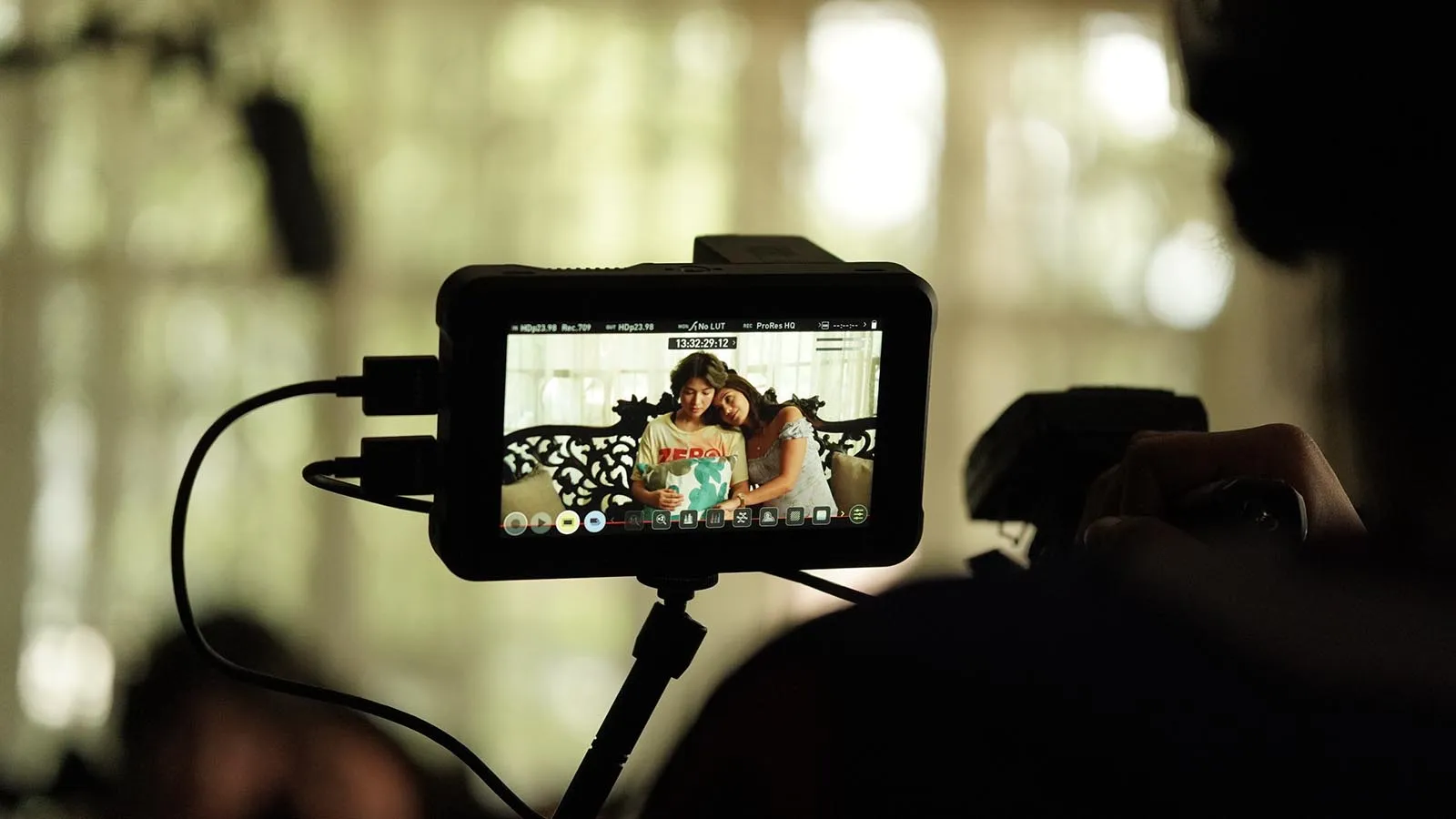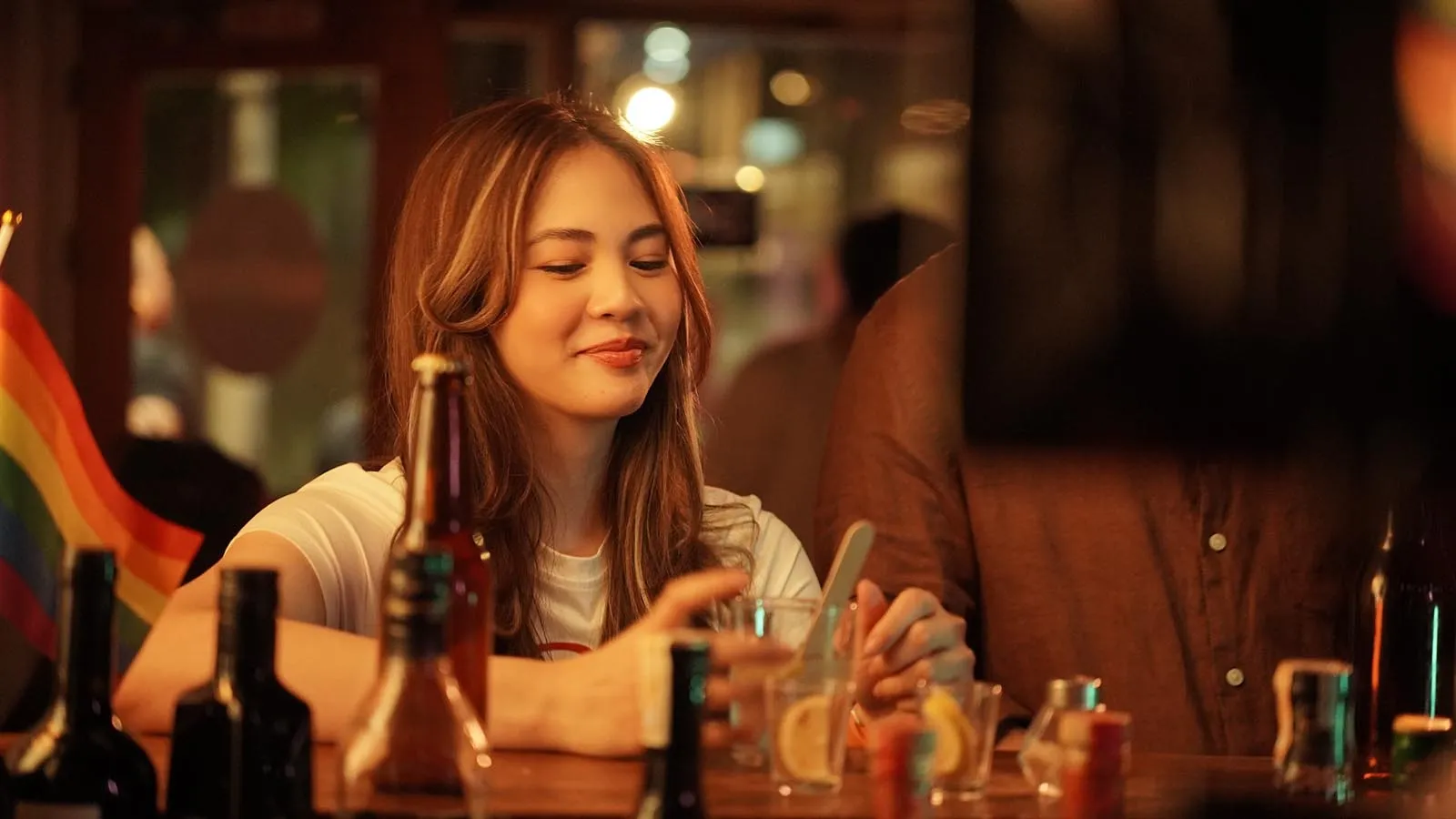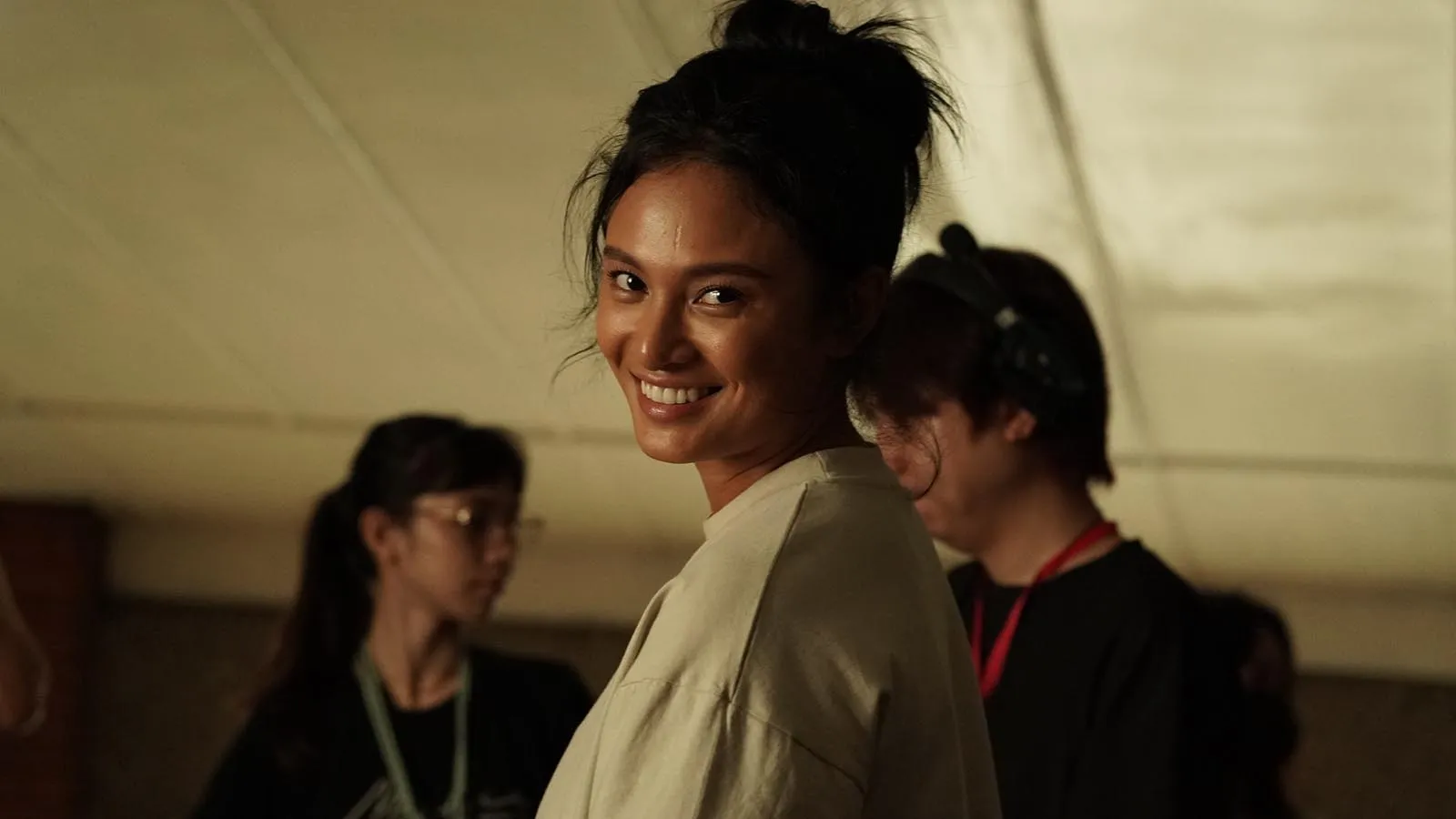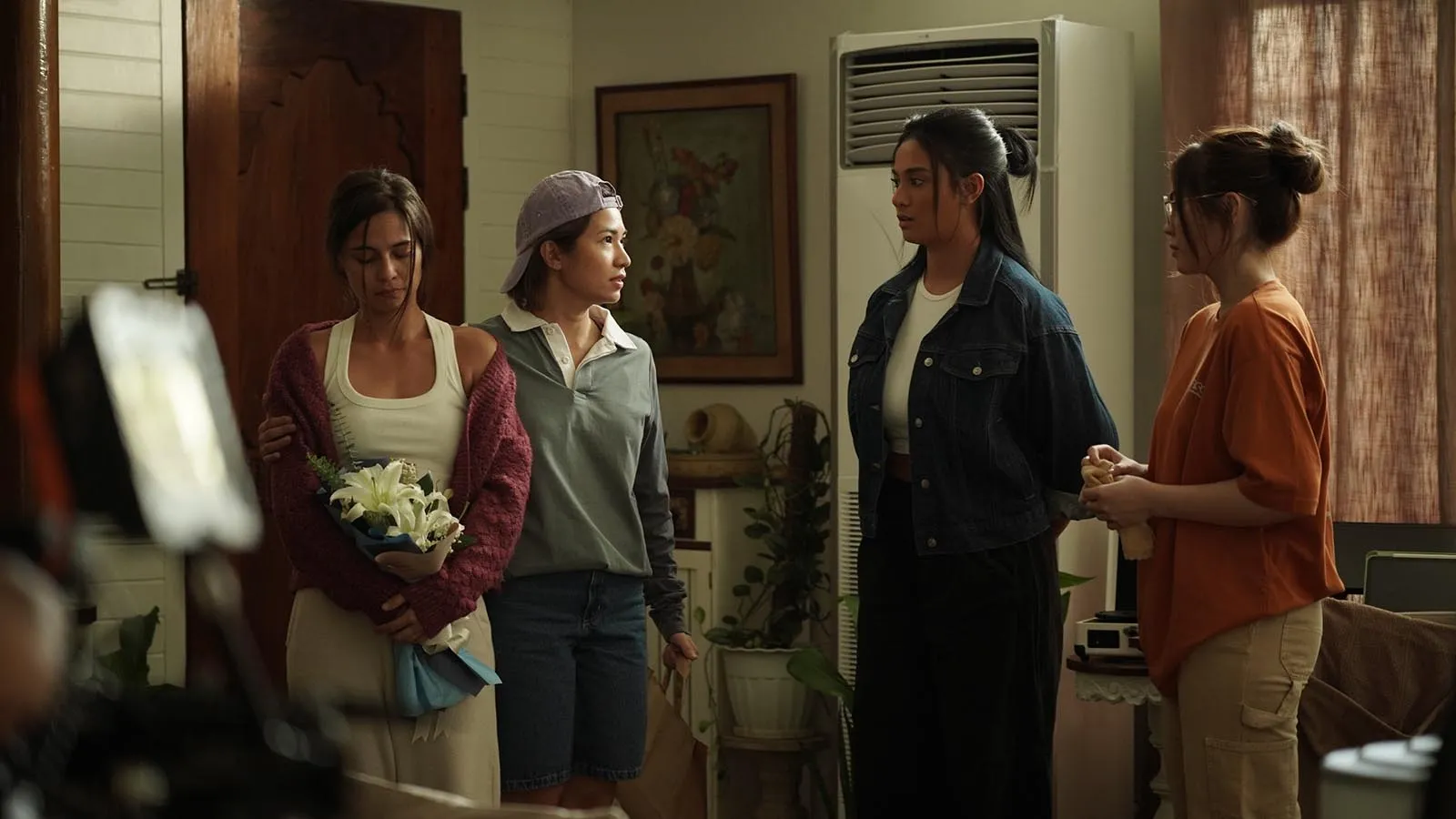Jasmine Curtis-Smith as Hannah Gabrielle Lopez in Open Endings. Courtesy of Open Endings
Courtesy of Open Endings
At this year’s Cinemalaya Film Festival, director Nigel Santos and screenwriter Keavy Vicente bring a fresh perspective to Filipino sapphic films.
There was much giggling heard with the cast of Open Endings. Even on a gloomy afternoon, they were chipper during a virtual interview with Vogue Philippines, joking and bantering with each other. “Ganito talaga kami (We’re really just like this),” says director Nigel Santos. “Actually, di kami sanay na Zoom call (We’re not used to Zoom calls), we’re used to hanging out in person.”
An official full-length Cinemalaya 2025 entry, Open Endings tells the story of four sapphic women in their 30s who, although exes, have become best friends. “From the outside, it sounds funny that it’s a general assembly of lesbians who are exes,” screenwriter Keavy Vicente says in a mix of English and Filipino. “But it’s not just funny. It’s a testament to the depth of the relationship of queer women that, from friendship to a relationship, you can smoothly move back to friendship.”
Even through the virtual call, the chemistry between Janella Salvador, Jasmine Curtis-Smith, Klea Pineda, and Leanne Mamonong can be felt; according to Santos, that feeling has always been there since the four were brought together for the film. “I saw them for the first time together, the four of them, during the chemistry test. I saw them and I was like, ‘This is it,’” she says. “The universe didn’t make it hard for me to choose who would portray the four characters.”

The four characters, Amihan “Mihan” Villanueva, Hannah Gabrielle Lopez, Charito Lyn “Charlie” de Guzman, and Marikit “Kit” Pineda, were written to be as human as possible. Santos describes each character as a “stage” in life that she and Vicente experienced. “Our goal was at any given point, the viewers would see themselves as one of the four girls,” she says. She also shares that this creative choice was inspired by the film Closer (2004) by Mike Nichols, which made her feel that she could relate to each character at different points in her life. “They’re people who are going through something, and they react to the things that they go through,” she says in Filipino.
For Santos, it felt necessary to tell a queer story under this light. “We’ve seen coming-of-age and tragic stories. We wanted to show something light and relatable,” she says. And even though there are romantic relationships in the film, what they wanted to highlight is queer friendship. “We wanted to show that they’re just the same as other friendships. It’s raw, imperfect, and messy,” she shares. “But in the queer community, we also consider them as a second family.” In that manner, they also want to make the audience feel as if they’re the “fifth friend” in the story.
As they were filming, the cast found themselves relating to their characters. Pineda, who plays Kit, relates the most to hers, saying that she slipped into the character with ease. “Kit and Klea are really the same in real life. To Kit, friendship is really important,” Pineda says in Filipino. Mamonong, who plays Mihan, also found it easy to portray her character. “Maybe the hardest part to learn was that Mihan is a Virgo,” Mamonong jokes. Both actresses are also openly queer and are making their film debut with Open Endings.

Meanwhile, Salvador, who plays Charlie, relates the most to her character’s astrological sign. “The first thing I asked when we did the reading was, ‘What’s her Zodiac sign?’ She’s also an Aries,” she shares. Aside from that, she enjoyed the independence and messiness of her character. Curtis-Smith’s character, Hannah, feels like the opposite of Salvador’s. “She has the most maternal instincts in the group,” Curtis-Smith says. “She’s actually the reason why they all came back together and started hanging out again.”
On set, the cast also developed a close connection to each other and the Open Endings team. Mamonong feels grateful for her first film experience. “I consider myself lucky that this is the team that I worked with on my first film,” she says. “They made it really easy for all of us and created a safe environment for us to be able to really explore and be comfortable with our characters.”
On the other hand, Salvador describes Open Endings as her “dream set.” “From all the people, productions, and sets I’ve worked with since I was a teenager, this is my favorite,” she says. “As soon as I entered the set, I could already feel how much love there is for the project, how much passion there is, and that they know exactly what they want to achieve with the film. And I love how they really got a team that consists of women and people who are part of the [LGBTQIA+] community.”

Driven by this passion, the team also held SOGIE and intimacy coordination workshops for the cast and crew. “It’s important that everyone knows what they’re fighting for in this film,” Santos says. As the film also has a few intimate scenes, they also prioritized safety and consent on set. With the help of intimacy coordinator Regina De Vera, the cast felt they had a safe space to deliver their best performances.
Pineda, who has primarily worked in television before, reflects on the experience. “I realized that it’s okay, as an actor, to talk about what you’re feeling if you’re not comfortable in a scene,” she says. Mamonong adds this sentiment. “It made the intimate scenes easier because, as an actor,” she says. “Everything is rehearsed, everything is done with consent.”
Many aspects of the film feel as if it’s the first of its kind. When asked if there were any queer films they drew inspiration from, Santos cited Bottoms (2023) and Booksmart (2019) as the inspiration for the friendship. But neither Santos nor Vicente had ever seen a film on four queer women’s friendships and ex-relationships. Curtis-Smith, who starred in the Sam Lee-directed sapphic film Baka Bukas (2016), reflects on how much queer films have evolved through the years. “There are more sapphic stories, especially on digital platforms,” she says. “But you’ll still see that on traditional media or TV it’s still very much lacking or still very much a token role or storyline.”

That being said, do they feel that the Philippines is ready for queer stories like Open Endings?
“I’m not sure,” Vicente says. “But ready or not, the material should be there because it’s the only way to normalize or increase it in the future.” Producer Tin Velasco also expresses her gratitude for the cast. “We will never know if the Philippines is ready or not, but I’m glad the cast is very supportive. I’m happy that our cast is twice as advocates for us about representation, how important it is to make queer films in the Philippines, and it matters for people to appreciate it.”
Aside from the queer narratives, they also hope that the film will set a precedent for film productions to prioritize safety and consent on set. “It’s not optional, it’s essential,” Santos says on the topic.
Above all, the team is guided by its advocacy for queer rights. “The fight naman will always be for the SOGIE bill,” Vicente says. “Maybe if they see these queer women living normal lives, being hurt by the same things that hurt you, but it’s 10 times harder for them because of the rights that they are not afforded, maybe it would spark that conversation.”
With Open Endings, Santos, Vicente, and their cast invite audiences into a world where queer friendship is embraced in all its complexity, imperfection, and warmth. And whether the country is ready for it or not, this one is a story they are prepared to tell.
- Behind the Vision of Autumn Durald Arkapaw, One of Hollywood’s Most Talked-About Cinematographers
- Exclusive: Guillermo del Toro on Bringing Mary Shelley’s Frankenstein Back to Life
- How Cole Walliser Made Glambot a Red Carpet Signature
- Noah B. Taylor on Instinct, Identity, and Finding Beauty in the In-Between
